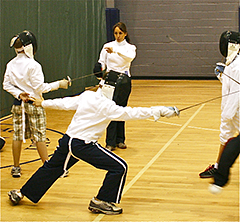
|
|
Vol. LXIII, No. 34
|
|
Wednesday, August 26, 2009
|
 EN GARDE!: “We teach the classic French style of fencing. We have students from five to 85! It’s never too late to start, and we have many adult beginners, as well as children. It’s something you can do your whole life.” Gabrielle Roux, co-owner of Sebastiani Fencing Academy, is shown instructing students. |
It is called “the oldest modern sport.” Long a favorite activity in Europe, it is growing in popularity in the U.S. It’s fun and challenging for all ages, and is notable for its strong focus on precision, concentration, coordination, and movement.
“I love fencing. I love the precision, the art,” says Gabrielle Roux, co-owner with Michel Sebastiani, and instructor at Sebastiani Fencing Academy. “I studied fencing in France with Michel, and then came to the U.S. 12 years ago.”
Master Sebastiani, who was head fencing coach at Princeton University for 24 years — and before that fencing coach at universities and colleges, including Cornell, New York University, Rice, and Brooklyn College, opened his academy in Princeton in 2000. He holds an MS degree in physical education from the National Institute of Paris, and is a graduate of the Ecole Superieuere d”Escrime of the National Institute of Sports, where he earned a Maitrise d”Escrime (fencing master).
Mr. Sebastiani was a member of the 1959 French National Team of Modern Pentathlon, and a member of the French Olympic team for the 1960 Games in Rome.
Personal Best
During his time as coach at various universities and colleges in the U.S., he helped his students win many fencing awards and titles. His Princeton teams (men’s and women’s) combined to win nine Ivy League championships and six IFA national championships.
Ms. Roux, who specializes in teaching younger children, strongly believes in focusing on technical precision and harmony of movement. At the academy, she emphasizes that students, whether beginners, intermediate, or advanced, develop skills and techniques that afford them the opportunity to achieve their personal best.
“Classes are organized according to ability,” she explains. “We have small groups, typically eight to a class, with three instructors. We give the students a lot of personal attention. There are no crowded classes.
“The classic French style of fencing has precise postures and movements,” she continues. “In the first lesson, students learn how to hold the weapon and learn the positions of attack and parry. Footwork is also very important. There are certain ways to move, including changes of direction and lunges.”
Students also study fencing technique and the theory of fencing (hand positions, offensive actions, defensive actions), basic tactics, and the international fencing rules.
“Fencing is wonderful for balance and coordination,” points out Ms. Roux. “And also for mental concentration. It’s very important to read your opponent’s mind.”
Protective Gear
Classes are 45 minutes, with two semesters per year. At the end of each semester, students take an efficiency test, in which they are judged on performance to determine their progress and whether they can advance to a higher level. Instruction includes foil, saber, and epee.
Special clothing and equipment is required for fencing. This includes protective gear, such as a face mask and a Kevlar jacket. The more advanced students wear special fencing shoes, but others can wear sneakers. Students may buy or rent the equipment, including swords.
“Fencing used to be considered an elite sport,” notes Ms. Roux, “But now it is accessible to everyone. Some of our adult students got interested because their kids are involved; for others, it may have been something they had done in high school or college, and now they want to come back to it.
“Also, I hear a lot from parents that it has such a good effect on their children. They have said, ‘my son or daughter was involved in so many different activities, and it was hard for him or her to concentrate. Now, they love fencing, and focus on it.’”
As fencing has become increasingly popular, more high schools and colleges have teams. In the area, West Windsor-Plainsboro and Montgomery High Schools, and the private schools all have programs.
“Also,” reports Ms. Roux, “many Ivy League colleges have fencing departments. Michel is very helpful in guiding students to colleges with fencing programs. He has also trained Olympic fencers.
Great Workout
“I love this job and the connection with the kids,” she continues. “I really enjoy teaching them and seeing them progress. And, it’s a great workout for me!
“We are very pleased that our membership continues to grow. We’ve had students who have been with us from the beginning. They are very loyal. We have two brothers who are students now who compete nationally.
“There has also been great word of mouth, and we have students from all over the area and beyond. We look forward to having even more people discover the enjoyment of fencing and to having them learn the right way.”
The academy offers a free introductory lesson for people so they can try their skill at “crossing the blades”, and it also hosts birthday parties to introduce kids to fencing.
Classes are available Monday, Wednesday, and Thursday at 6, 7, and 8 p.m. A yearly membership fee is charged, and students may attend as many classes a week as they wish, at additional cost. Special family discounts are offered.
The fall season begins September 14 with classes held in the Stuart Country Day School gym. A special summer camp program is available in July and August. (609) 578-0765. Website: www.sebastianifencing.com.